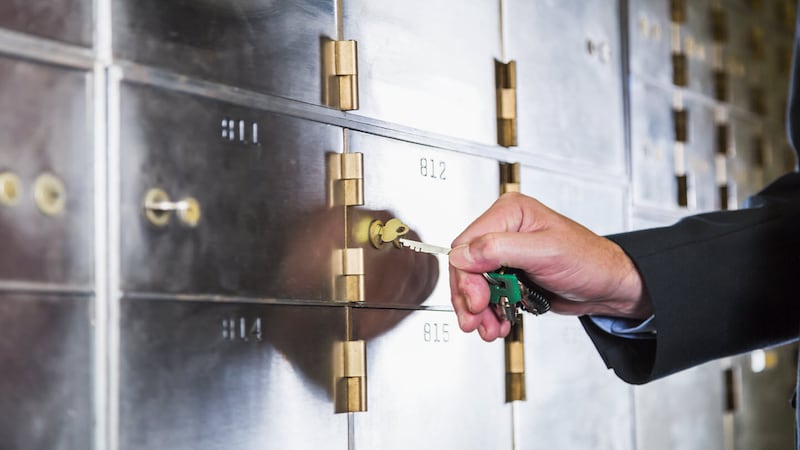What is a safe deposit box, and how does it work?

Quick insights
- Safe deposit boxes are metal containers stored in a bank’s vault for safeguarding important or valuable items.
- These boxes may be suitable for storing legal documents, family jewelry and other valuable items.
- Cash kept in a safe deposit box generally isn’t insured and doesn’t earn interest, so a savings account may be a better option.
From storing family heirlooms to wills to collectibles, safe deposit boxes offer a way to help protect difficult-to-replace or irreplaceable items. Banks often put measures in place to help guard these items from theft and natural disasters.
However, these boxes usually don’t include insurance, aren’t climate-controlled and can’t be accessed outside of bank hours. That’s why they may not be ideal for storing certain items like cash or perishables. Here are some things to know about safe deposit boxes, including examples of items to keep in them and potential storage alternatives.
How safe deposit boxes work
You can rent safe deposit boxes from banks or credit unions. People often use these boxes to store documents, valuables, keepsakes and any other items they want to help protect. Access to safe deposit boxes is limited to the bank’s operating hours.
Some banks provide a key for access, while others may use biometric methods like fingerprint or hand scans. You can usually designate co-lessors to have access to the box. You may want to consider granting someone power of attorney to access the box in case of emergency.
Safe deposit boxes come in various sizes, with the largest typically measuring 15 by 22 inches. Some banks may offer private vault rooms about the size of a small closet.
With the growing reliance on cloud storage for important documents, fewer banks and credit unions may offer this service.
What to store in a safe deposit box
The features of safe deposit boxes may make some people feel more confident than their home storage options for certain items. For example, it’s often complicated to replace a property deed. As banks generally have more protection measures in place to protect these items than the average home, some people may prefer to keep documents like property deeds in a safe deposit box.
These boxes are often constructed from fire-resistant materials and stored in vaults with watertight seals, but it’s still possible that items stored in these boxes could get lost, damaged or destroyed.
Safe deposit boxes can be useful for items that are valuable but don’t require frequent access. Here are some examples:
- Birth certificate
- Social security card
- Marriage license
- Property deed
- Copy of a will
- Car title
- Trust documents
- Stock and bond certificates
- Collectible coins
- Family jewelry
- Heirlooms
- Family photos
- School transcripts
- Hard drives
- Copies of power of attorney
What not to store in a safe deposit box
While safe deposit boxes can be useful for storing certain items, they might not be the ideal solution for others. These boxes aren’t climate-controlled, can only be accessed during limited hours and lack some features of savings accounts.
For these reasons, it’s generally not recommended to store the following items in a safe deposit box:
- Emergency items: Passports, medical directives or anything you might need outside of the bank’s operating hours.
- Cash: Money kept in these boxes isn’t federally insured or able to earn interest—unlike a savings account.
- Perishable items: Anything that can spoil in the safe deposit box.
- Anything illegal: Illegal items could potentially result in legal consequences and confiscation.
- Uninsured valuables: As safe deposit boxes don’t come with insurance for your stored items, you won’t be compensated for lost or damaged items unless you insure them.
Pros and cons of safe deposit boxes
As you decide whether a safe deposit box is right for you, you may want to consider these pros and cons:
Pros
- Banks generally have advanced alarm systems and closed-circuit surveillance, which may help prevent theft.
- The boxes are usually designed to withstand floods and fires, which could help protect your items in the event of a natural disaster.
- You control who has access to the safe deposit box, which can help enhance the privacy of your stored items compared to home storage.
- Keeping items in a designated location outside your home may reduce the risk of misplacing them.
Cons
- Due to the bank’s limited operating hours, storing items like cash or passports may not be ideal, as you might need quick access during emergencies, such as natural disasters.
- Banks usually don’t insure the items in a safe deposit box, and purchasing an insurance policy for them—which is generally recommended—is an added expense.
- The cost to rent a safe deposit box is usually higher than many home storage options.
- Although uncommon, there’s a chance items stored in these boxes could be lost.
Alternatives to safe deposit boxes
- Home safes: These safes allow you to access your items immediately, and certain models may be fireproof and waterproof.
- Online storage: Digital cloud storage lets you store your documents virtually without having to worry about their physical location.
- Savings accounts: These accounts are federally insured to a certain or limited dollar amount and may allow you to earn interest on your savings. Funds can usually be accessed via online banking, ATMs, electronic transfers or in-person withdrawals at a branch.
- Vault companies: Some companies specialize in vault services, providing various box sizes, insurance and flexible operating hours—though the cost is generally higher than the standard services banks offer.
- Document bags: These fireproof and waterproof bags could be an affordable and portable option for storing important documents.
In summary
Safe deposit boxes are metal, fire-resistant containers stored in a bank’s vault. You can rent these boxes to store valuables like important legal documents, jewelry and family photos. However, you may want to avoid storing items you might need immediate access to, such as a passport. It’s generally not recommended to keep cash in a safe deposit box, as it won’t be federally insured or earn interest.
With the rise of cloud storage, fewer banks may offer safe deposit boxes. Beside cloud storage, some potential alternatives include home safes, savings accounts, vault companies and document bags.



